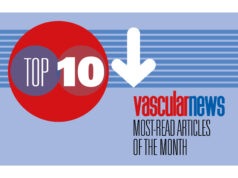 Highlights from the UK Vascular Societies’ Annual Scientific Meeting (VSASM 2021; 1–3 December, Manchester, UK), a VOYAGER PAD subanalysis, and Cordis’ appointment of a new CEO caught readers’ attention in December.
Highlights from the UK Vascular Societies’ Annual Scientific Meeting (VSASM 2021; 1–3 December, Manchester, UK), a VOYAGER PAD subanalysis, and Cordis’ appointment of a new CEO caught readers’ attention in December.
1. VOYAGER PAD subanalysis highlights risks for claudicants undergoing revascularisation
Principal investigator of the VOYAGER PAD trial, Marc Bonaca (University of Colorado Anschutz Medical Campus, Aurora, USA) speaks to Vascular News about the latest data from the study, which indicate that patients with claudication are at high risk for adverse limb events and cardiovascular events after undergoing revascularisation. Bonaca highlights the significance of the findings—which he presented at the American Heart Association (AHA) Scientific Sessions (13–15 November, virtual)—and, speaking on what is next for VOAYGER PAD, relays that “there is a lot yet to come”.
2. Cordis names George Adams as chief medical officer
Cordis has announced George Adams as chief medical officer. Adams is globally recognised for his expertise in the treatment of peripheral vascular disease in patients with chronic limb-threatening ischaemia (CLTI) and treatment of coronary artery disease in patients with acute coronary syndromes, a Cordis press release details. He is involved in the development of regional and national systems of care for the treatment of CLTI, ST-elevation myocardial infarction (STEMI), and management of complex coronary and peripheral vascular disease.
3. Alio and Lifeline create partnership for dialysis access patient monitoring
Alio has announced a partnership with Lifeline Vascular Care in support of patients living with end-stage renal disease (ESRD). Alio leverages artificial intelligence (AI) and the company’s SmartPatch sensor technology to non-invasively monitor vascular access health and other chronic conditions faced by ESRD patients. The partnership facilitates Lifeline’s collaboration in several different capacities: as a clinical trial partner, as a purchaser of the Alio remote monitoring system, and as an active participant in value-based care arrangements.
4. Collaborative effort key to investigating potential biomarker of acute aortic syndrome
Research indicates that plasma desmosine has the potential to act as a biomarker of acute aortic syndrome and could, in the future, be used as a diagnostic tool for the condition in the acute setting. Presenting the findings of a British Heart Foundation-funded study during the Sol Cohen Prize Session at the UK Vascular Societies’ Annual Scientific Meeting (VSASM 2021; 1–3 December, Manchester, UK), Maaz Syed (University of Edinburgh, Edinburgh, UK) concluded that a multicentre, collaborative effort is needed to propel future investigation. The British Heart Foundation-funded study, published as an abstract in Heart, was a collaborative effort between the University of Edinburgh and Anna Maria Choy’s team at the University of Dundee, Dundee, UK.
5. “Experience matters” when predicting patient outcomes following major lower limb amputation
Research indicates that healthcare professionals perform better than risk prediction tools at predicting 30-day mortality, morbidity, and revision risk in patients following major lower limb amputation. The PERCEIVE study is led by chief investigator David Bosanquet (Royal Gwent Hospital, Newport, UK), funded by Health and Care Research Wales’ Research for Patient and Public Benefit scheme, and delivered by the Centre for Trials Research (Cardiff University) and the Vascular and Endovascular Research Network (VERN). Presenting early data from the PERCEIVE study during the Sol Cohen Prize Session at the UK Vascular Societies’ Annual Scientific Meeting (VSASM 2021; 1–3 December, Manchester, UK), Brenig Gwilym (Royal Gwent Hospital) stressed that determining the accuracy of healthcare professionals’ predictions is extremely important when validating risk prediction tools to put their performance into context.
6. Fist Assist receives FDA Breakthrough Device designation for wearable vein dilation device
Fist Assist Devices has announced that it recently received Breakthrough Device designation from the US Food and Drug Administration (FDA) for its Fist Assist Model FA-1 device.
7. Terumo Aortic announces launch and first commercial use of Aortic Balloon device
Terumo Aortic has announced the launch and first commercial case of the Aortic Balloon in the USA. The device assists physicians in the expansion of the aorta when using Treo and Relay stent grafts in endovascular aortic repair, a press release details.
8. Large-scale IVUS analysis adds “meaningful data” to growing pool of evidence
A large-scale analysis of the use of Philips’ intravascular ultrasound (IVUS) in lower extremity peripheral vascular interventions adds “meaningful data” to a growing pool of evidence advocating the continued use of the imaging methodology, Eric A Secemsky (Beth Israel Deaconess Medical Center and Harvard Medical School, Boston, USA) tells Vascular News. The focus now, he believes, should be on understanding and addressing barriers to widespread adoption of the technology.
9. Terumo Aortic announces PMDA approval for RelayPro endovascular device in Japan
Terumo Aortic has announced that the Japanese Pharmaceuticals and Medical Devices Agency (PMDA) has granted approval of the RelayPro thoracic stent graft system for sale in Japan for the treatment of patients with thoracic aortic aneurysms (TAAs).
Cleaning and low-level disinfection (LLD) effective against bloodborne pathogens are safe and sufficient procedures for disinfecting ultrasound transducers used in percutaneous procedures—this is according to an intersocietal position statement recently issued by the American Institute of Ultrasound in Medicine (AIUM).













